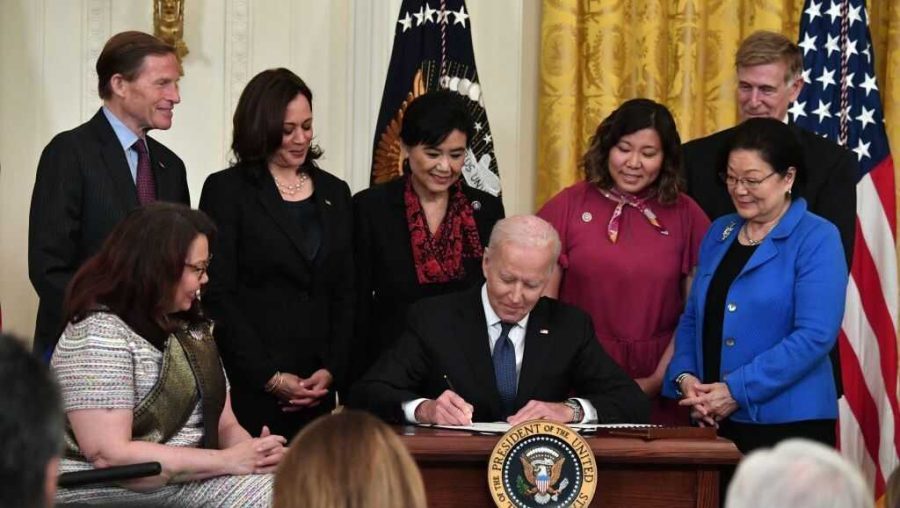Solidarity with the AAPI community is necessary
The response to the rise in anti-Asian hate crimes during the COVID-19 pandemic has been insufficient
President Joe Biden signs the COVID-19 Hate Crimes Act into law.
March 30, 2022
When I first heard about the recent unprovoked attack against a 67-year-old woman of Asian descent, I immediately thought of my own Korean grandmother.
The violent attack occurred on March 11 in Yonkers, N.Y., after the woman passed by and ignored a man as he called out a racist and misogynistic slur. The man — who the police identified as 42-year-old Tammel Esco — then followed her back to her building where he proceeded to hit her repeatedly over 125 times, stomp on her seven times and spit on her before walking away.
Though anti-Asian violence is not a new issue, the number of these attacks has rapidly increased since the beginning of the COVID-19 pandemic due to the enabling of pandemic-driven, anti-Asian rhetoric by those in positions of power — such as former president Donald Trump.
According to the Center for the Study of Hate and Extremism, anti-Asian hate crimes increased nationally by 260 percent in 2021 versus 2020.
This jump in numbers reflects the significance of speech and shows how hateful rhetoric can have dangerous consequences. When Trump refers to COVID-19 as the “Chinese Virus,” “Wuhan Virus,” or “Kung Flu,” he actively perpetuates a harmful and false narrative that serves to place a target on the backs of Asian Americans and Pacific Islanders (AAPI).
While Esco was charged with attempted murder and assault, both as hate crimes, a prevalent issue is that these attacks are often not classified as such. The inability of prosecutors to charge these attacks as hate crimes makes it difficult to highlight the severity of the issue and results in a failure to acknowledge the root of the problem — racial prejudice is ingrained within our society.
In May 2021, President Joe Biden signed the COVID-19 Hate Crimes Act into law. This legislation aims to raise awareness about and increase the accessibility of reporting hate crimes.
However, this alone is not a solution. It is incredibly important for there to be solidarity across racial lines in order to move towards any type of social change, especially since AAPI people are often viewed as foreigners in their own country. People must be willing to challenge negative racial stereotypes in order to help combat the violence that results from them.
It seems as if there is a new incident every week. When I see the victims of these attacks, I cannot help but see the faces of my own family. It should not be burdensome to imagine my grandparents doing the most mundane activities due to the lingering fear of a brutal attack in the back of my mind.
It can be difficult not to feel a sense of hopelessness that stems from witnessing senseless attacks against people simply because of what they look like, especially when they look like my own mother.
I try to avoid the graphic videos that often circulate across social media after one of these attacks because it is too easy to see a loved one in their position. I imagine that this is a common feeling shared among people of Asian descent and may even have significant impacts on their mental health.
As the discussion surrounding the increasing anti-Asian sentiment and subsequent rise in anti-Asian hate crimes becomes more present within the national conversation, it is important to highlight and listen to voices within the AAPI community, while also remembering that the responsibility of solving these deeply-rooted issues does not fall solely on their shoulders.
The AAPI community should not have to live in fear for no other reason than existing. There is so much joy and pride that is a part of the AAPI experience, and it is important to hold onto these feelings while navigating the challenges of the future.























